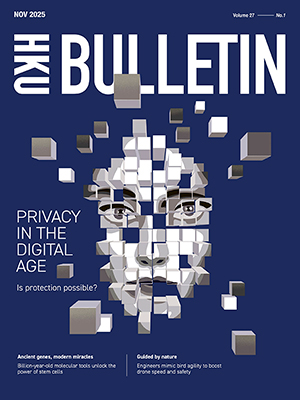May 2025 | Volume 26 No. 2
Technology in the Courtroom
Listen to this article:
Live broadcasts of court proceedings have become more common around the world, especially since the COVID-19 pandemic. In China, they are also part of an effort to encourage judicial transparency.
But sentiment about such broadcasts is divided. Some fear that judges and lawyers play to the cameras and that decisions will be badly affected. Others fear that all parties involved will be very nervous with livestreaming. In the US, David Souter, former Associate Justice of the Supreme Court, once famously said “the day you see a camera come into our courtroom, it’s going to roll over my dead body.”
Professor John Liu in the Faculty of Law, however, has been sceptical about such risks, which he calls ‘folklore’. Recently, he decided to test the matter in a randomised control trial involving 85 cases in China, including civil, criminal and administrative (suing the government) cases. Some cases were assigned to be broadcast live and all participants in the trials were told of this; the others were not broadcast. The language and behaviours of everyone involved were analysed using a combination of AI audio recognition tools and manual review.
“What we found out is that some of the folklore is just not true. Judges and lawyers do not play to the cameras or change their behaviour. These repeat players are not influenced or affected in a bad way by live streaming,” he said.
“On the other hand, the parties – the litigants – are somewhat influenced. They appear to be nervous, and they speak at a slow speed and convey less information in trials that are broadcast live.”
Detecting trends
While this may affect litigants’ perceptions of the judicial process – a matter that still needs to be studied more closely – Professor Liu said it demonstrates that judges may be too conservative about the risks of a tool that enhances transparency in the courtroom.
The study ties in with his larger body of work looking at judicial behaviour using data analysis. A major catalyst for this work was the decision by the Supreme People’s Court in China in 2014 to promote transparency in judicial proceedings.
Apart from encouraging all courts in China to broadcast their proceedings, the reform led to the online publication of judicial decisions – about 100 million cases so far. Professor Liu is using data analytics to understand the factors that may influence the decision-making process in these cases. For instance, one of his projects found that clients were more likely to win cases if their lawyer was previously a judge.
He has also noted that the judiciary itself is starting to use data analytics to flag such issues as inconsistencies in criminal sentencing across judges, so they can be addressed.
“There are lots of new technologies available and I think the judiciary should think in an innovative way to accommodate them in their decision-making process to improve efficiency and also fairness,” he said. In 2024, he published the book Can Machine Replace Judges? Artificial Intelligence, Data Science, and Law that introduces the topic of technologies in the courtroom.
AI factors
Professor Liu is also investigating how AI may affect judicial decision-making. One line of study has found that AI and large language models may reinforce judicial bias.
“You now have a convenient tool and with convenience, you may be less likely to write and think thoroughly. It’s pretty easy to direct the model to write anything you want, which might reduce self-reflection and reinforce decision bias,” he said.
Another study, still underway, looks at public reaction to the involvement of AI in judicial decision-making and whether people can distinguish judgements written by AI or judges and whether that influences their trust in the process.
Nonetheless, Professor Liu believes AI can be beneficial in law through human-AI interactions. “In many scenarios, it is very unlikely for AI to replace human decision-makers. More likely, the human will be in the decision-making role and the AI will be the assistant. The interaction of judges and AI is a good example to explore because first, it is very unlikely machines can replace judges. And second, court proceedings are a high-stakes scenario unlike, say, asking if AI can write a joke.
“I hope my study of this interaction can contribute not only to understanding AI’s application in the judicial field, but also to people’s understanding of human-AI interaction in general,” he said. Professor Liu was recently awarded the University’s 2023–2024 Outstanding Young Researcher Award for his work.
There are lots of new technologies available and I think the judiciary should think in an innovative way to accommodate them in their decision-making process to improve efficiency and also fairness.

Professor John Liu

